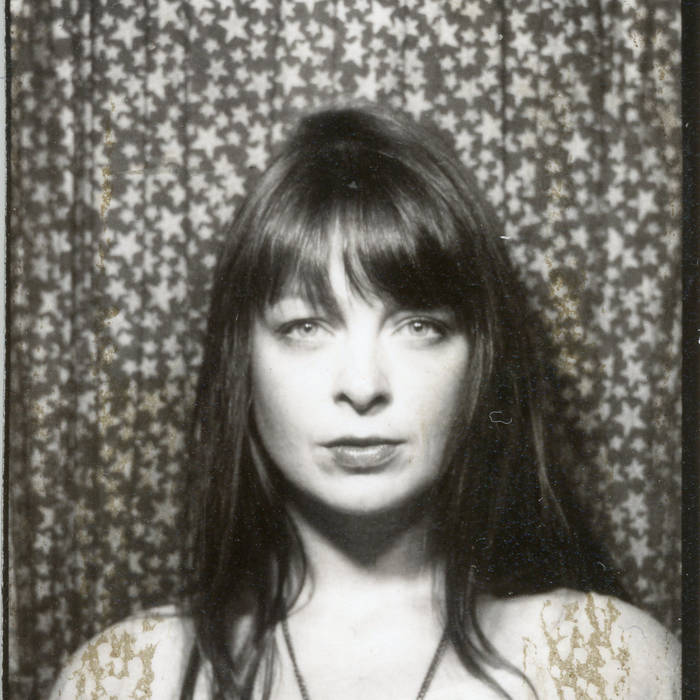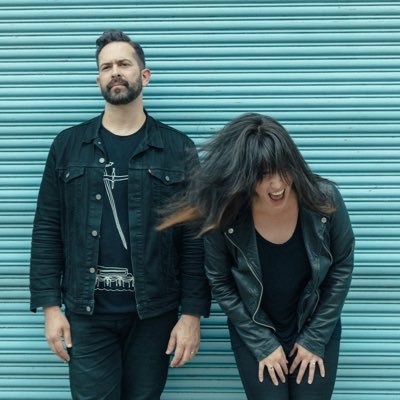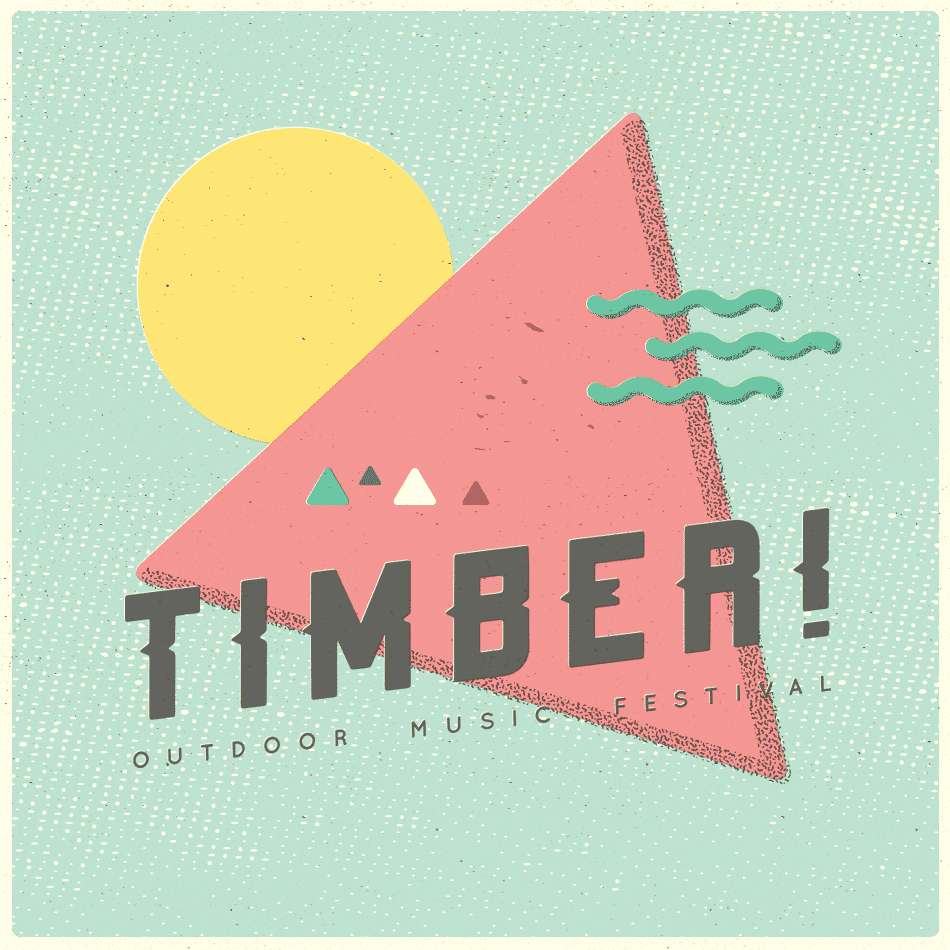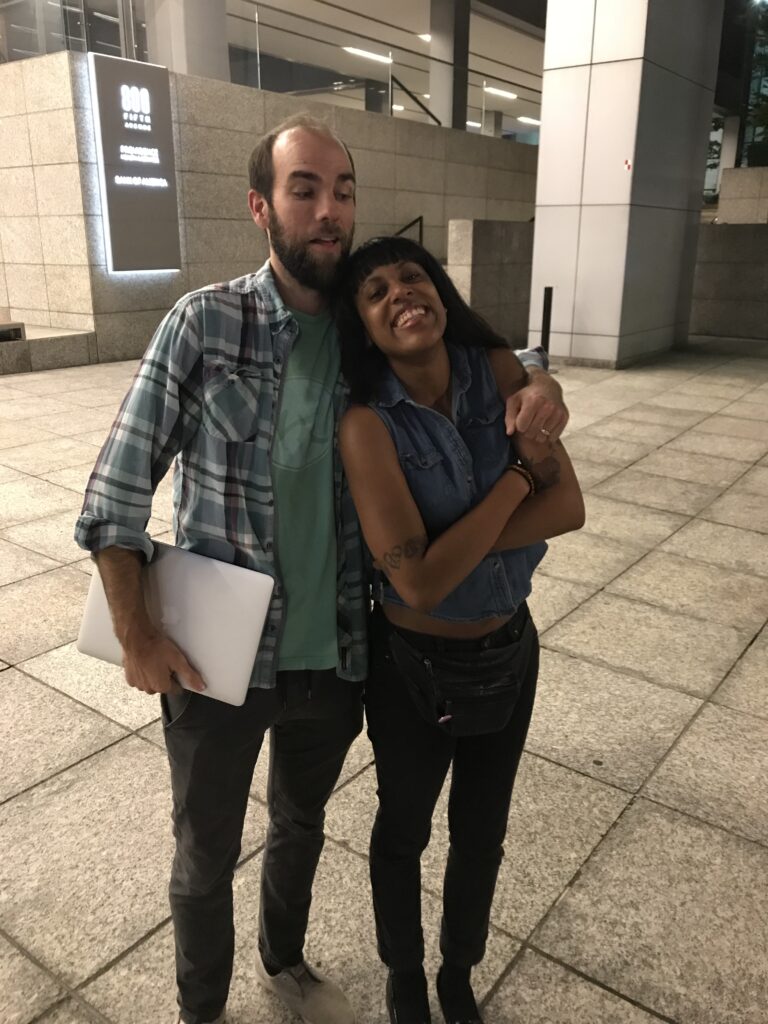
Editor’s Note: While this interview took place before the current pandemic, we feel it’s a great look at how and why two local DJs, both staunch supporters of local music, do what they do. And that’s a much-needed reminder of why, to coin one of these stations’ phrases, the music matters. Enjoy.
Eva Walker and Steven Graham host the two most high-profile local radio shows in Seattle. Eva, who hosts KEXP’s Audioasis show on Saturdays from 6-9pm (and fronts the band, The Black Tones), and Steven, who hosts 107.7 The End’s Locals Only on Sundays from 8-10pm, have years of experience between them, sifting through song submissions and in-studio requests. As a result, we thought it would be a good idea to catch up with the DJs to have them talk about the joys and plights of the position.
Eva: What’s the best thing about being the 107.7 local show host for you?
Steven: I think that the platform is pretty powerful. The Black Tones, The Grizzled Mighty, Duke Evers, BEARAXE, I feel like that kind of stuff could be played on any alternative station anywhere in the country and do just as well as anything else that’s being played. But for one reason or another that stuff hasn’t gotten there yet and I have this opportunity to say, “Here’s all this, this is right here at home, you can go support these people who really need it through more than Spotify streams and you can go and see them play live and go and buy merch.” On the other side of that, I can say, “Here are some hip-hop artists and it’s a totally different flavor from what you normally hear on this station. Here’s some more traditional Americana artists you might not hear on this station. But in this format and this time slot, it’s okay to play this.” What do you think is important about doing a local show and having a platform at KEXP?
Eva: It’s still shocking for me. But it’s also in a weird way not because it’s something that I like doing: curating a space and discovering people. That’s really fun for me. So, while it’s surprising that it was KEXP where I ended up, I remember being much younger and telling myself, like, “Okay, if I’m not a rock star, that’s okay. But I want to do something that still involves music.” It’s important because it’s the community’s grand stage and you’re introducing people to what could become their favorite artist.
Steven: It’s exciting to dive through every one of those submissions hoping that you’re going to find that one that’s a real gem, right? But I’m sure you have the experience that I do that just, like, 80-90% of it is just not there yet for one reason or another. I try to be really objective about that and take it outside of my taste and say even if this is not what I would want to listen to I can still acknowledge that it was done well. And if that’s the case, I’ll put it on the show.
Eva: Yup.
Steven: But a lot of times you don’t even find that. The ability to know when you hear something good is crucial. Every now and then I’ll hear something and go, “You know this isn’t quite there but it’s cool and I know it’s just going to make this band’s day!” Maybe the sound quality is not quite there, but there’s something about the songwriting, something about it that I love just enough and I know the way they approached me and everything about this was very sincere. I want to make their day and it makes me feel good.
Eva: When I’m about to play a band who’s never been played on the radio and I hear something and it’s really good, right before when I’m in the booth and I’m about to play it, I just smile, like, “I’m about to make their freaking year, this is so exciting!” They have no clue I’m about to push play on their song right now and that is a really good feeling!
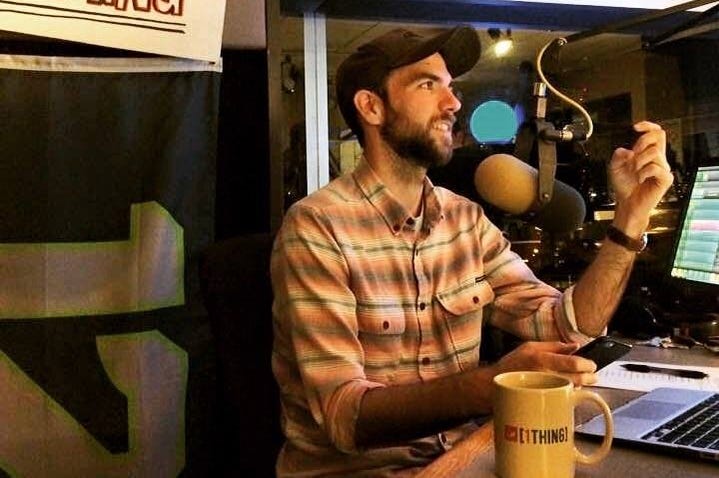
Steven: But it’s hard, too, because I think some of these artists think that, “Alright, I’m going to get played on a big station, whichever it is, and now the world is just going to fall at my feet!” Have you ever had this thing happen where it gets played and you can tell their perception of that is now, like, “Okay somebody is going to call now!” But, it’s like, I’m sorry. I’m not going to say that’s never going to happen… But you feel really great for a minute about it and then they start coming to you and going, “Can you play it again? When’s my in-studio?” But it’s like, Whoa!
Eva: That’s the story of my job right now! And I’ve been on both sides of that, as a musician. Like, before getting this job, it’s like, “Dude, I just wanted to be played once, that’s all I needed!” And then thinking, “Okay it happened, are labels going to be knocking at my door?” And then now on this side of it, being like, “That’s not how it works!” People emailing me who I’ve played once going, “Hey, now can you do this, now can you get me in rotation, now can you put me in the library, now can we schedule an in-studio?” And I’m like, “Whoa, wait a minute!” That leads me to my next question: what is the hardest part for you about being the host of the show?
Steven: I do think the hardest part is, you know, dolling out the rejection. A lot of times – and I feel like it’s a very millennial way to do things, you see the emails, you hear the music and you’re like, “Eh, I don’t like that.” And your option could be not to respond.
Eva: That’s my response…
Steven: And I’ve done it too. A lot of times what I’ll do – like, I had one band the other day and it was actually someone I met when I was speaking at the [KEXP] Mastering the Hustle event. He sent me his music and I was listening to it and I was like, “You know what? This is good.” It was kind of trancey instrumental stuff. I was like, “This is good but this isn’t really something I would play on the show.” He sent me a follow-up email saying, “Hey, I noticed you haven’t played it yet. But any feedback you can give…”
And I have a lot of bands that go, “Honestly, give me any honest feedback.” And I say that I listened to it but for one reason or anther it just doesn’t feel like the right fit for the show and you can tell that they want you to tell them what to do – not everybody – but some of them want you to tell them this or that is the formula. Like, “This is what I want you to do, this is how I want you to change and I’ll play you on the show.” But I just say, “Hey, I really think that you should just keep making the art that you want to make. Don’t let me or anybody else tell you how to make your music. Make what you want to make. Grow your circle and let it find the audience that it’s meant for. Somebody’s going to be into this. It’s just not necessarily what we’re looking for this show right now.”
Eva: Absolutely.
Steven: It’s really hard because you’ll say that kind of stuff and people will still go, “Well, what’s wrong with it?” And, like, no, no, no. I’ve had people try to tell me that I don’t like Country music or I don’t like Hip-Hop. But it’s like, “No, you’re projecting that because I work at the alternative station but if you actually listened to the show you’d know I play stuff like this.” I’ll play Dean Johnson. I’ll throw Sol and Brothers From Another and I’ll let Kevin Murphy from the Moondoggies come by and do a bunch of twangy stuff. It’s all over the place. The reality is for one reason or another, the song is not there yet. I try really hard not to say it’s not good. But they want you to tell them specifically what’s wrong with it and that just kills me. That’s not the part of the business I want to be involved with at all. But where we’re at, when people want to find a way to get through that door, they’re not getting the airplay, so they want to know how to fix it. But it’s like, I don’t really know how to tell you that. What do you think about that?
Eva: With some people, the ones specifically that you mention who would say you just don’t like Country or you just don’t like Rap, they believe in their project so much and because they like it so much then it’s easier to say, “Oh you just don’t like that genre.” It has to be me that’s the problem, right? But it’s like, “No, I don’t knock the entire genre just because I don’t like your song. That’s insane, that’s delusional.” The core of that from a given artist is just, like, “I really believe in it so you have to because I do.” But, it’s like, they’re too old to lack a theory of mind! They should know better, right? The people who want the formula – it’s like, are you in it for the music or for the reward?
Steven: Exactly.
Eva: I know there must be people who hate my record, Cobain & Cornbread, who hate my guitar playing, who think I can’t play a single lick and they’re half-right on that last part! But, it’s like, this is what came out of me and this is what I really like and I wouldn’t change it, you know? But everyone’s not going to like it because there are 8 billion people in the world. So, I don’t like to tell people – just like what you said – what to change. Because it’s all relative. I can tell you how I would play the song with drums and bass and guitar but you’re, like, an electronic group!
Steven: Let me ask you about demos, and this will probably come back around to talking about the submission process, but people send me things all the time and they go, “Hey, this isn’t done yet. It’s not mastered yet. But I wanted to give you a preview.” I used to listen to those things but I found myself saying, like, “I don’t know, this feels like a waste of my time.” Do this: finish it. Get the version that you feel is the best representation, one that you’re excited to send out into the world and then send that to me!
Eva: Yes!
Steven: What if I get excited about this and then I get it back and it’s not the same? I had that happen one time. I had a band send me a song and they had put just one song on Bandcamp and it was just a demo. I played it on the show a couple of times and they were very excited to finish the rest of their songs and get in the studio and record them and when they sent me the record, I wouldn’t play the new version of the song on the show. I would play the old version and I felt really bad. But when people are submitting things to you, what do you want to hear?
Eva: I want people to take risks. I want something that’s just completely different that isn’t following some status quo. Rather, it’s like they decided, “This is me and people just have to deal with it.” And that doesn’t mean it has to be some crazy-from-Mars music. It could be! But it could be really, like, if you’re going to go Country then go fucking Country! There’s a lot of stuff that sounds the same because people just want a formula. So then everyone all starts sounding the same and none of it sticks out. So, uniqueness is a key thing for me. It makes me so happy when I hear something that’s even a little bit different and it’s good. There is different-bad, of course. But there’s also different-GREAT.
Steven: I get really excited when I dive into the Locals Only email and I’ll hear something and I’ll go, “Oh, this doesn’t sound like anything I have on my show right now!” Just because of that it’s probably going to get pretty heavily featured over the next couple of weeks. Again, I wouldn’t encourage people to make something that sounds like it came from Mars just because they hope that it will get played. But if there’s something about it that happens to stand out – and that’s that thing that you can’t really define – then there’s a good chance that, if it’s done well, it will probably end up on the show. Your show three hours, right?
Eva: Yes, three hours.
Steven: You’ve got three hours and I’ve got two hours. That’s our window for the whole week. That’s valuable real estate and you want to use it well. You want the listeners to trust you because you want them to keep coming back so you can keep showing them and sharing with them the really good stuff. I feel like – I’m coming up on five years of doing this show and for five years I feel like I’m still trying to beat people over the head with Dude York! I think Dude York is one of the best bands in the country and I feel like I’m still cramming Dude York down people’s throats. Like, it’s so good! And I’m going to do that with them and I’m going to do that with Sol and Car Seat Headrest, who is a huge artist playing all over the world and is in the medium- to bigger-print on most festival posters and I’m still playing Car Seat Headrest every other week, like, you should think about this band the way you think about Death Cab, he’s that good!
Eva: That’s what bands like Black Ends does for me, they’re so unique. Chong the Nomad does that for me. I love Kraftwerk and I hear a little bit of Kraftwerk every time I hear Chong the Nomad. And Warren Dunes does that for me. I mean, Warren Dunes, I feel like they invented a style! I told [Warren Dunes frontwoman] Julia [Massey], “Julia, you are like Carole King and Paul McCartney and Metallica!” PBS Metal is what I call Warren Dunes. You’ve got this friendly Julia voice and then you’ve got this banging, rocking drums and guitar and then this, like, doot-doot-doot staccato piano. I’d never heard anything like Warren Dunes ever! When I first heard them, I was like, “What the fuck is this!?” I’ve never heard a band that sounds like Carole King and Metallica at the same time! It’s Sesame Street in Guantanamo Bay.
Steven: At the risk of, like, drilling down too much on one specific artist, they are, between us, an otherworldly combination.
Eva: No one sounds like them and that’s what I’m looking for! And the first time I heard “Ghost In The Shower” by Chong the Nomad, I was actually in my bed with my computer on my lap and her team submitted that song to me. I sat in my bed, listened to it, like, “Ghost In The Shower” that’s a cool title. And then my mind exploded, my brain was all over the bed, blood everywhere. The song was so good. I’d never heard anything like that in my life and I think I played it that night on my show. That’s the thing! If it just makes me go, “Whoa!” then yes!
Steven: I feel like we could go round and round for hours with our favorite artists. But going back to what I was saying about the real estate of the show. If your stuff doesn’t get played that doesn’t necessarily mean it’s bad. It’s just there’s a lot of really good stuff in Seattle and the Pacific Northwest right now. I look at everything between Vancouver B.C. and Portland, from the peninsula out to Boise. And it’s really easy to fill two hours and then at the end of it to scratch your head and be going, “How come I didn’t play these three things that I really wanted to play?” So, if your stuff doesn’t make it in, it’s not that you’re doing anything wrong necessarily.
Eva: Absolutely.
Steven: The other thing I would say is that if you’re sending things, I don’t necessarily get bogged down at all when you submit your work with the story of how your band came to be. All I want to know is where you’re from and give me the music. For a starting point, just tell me what city you’re from in the Pacific Northwest and let me hear the music. A streaming link is best because my email space keeps filling up because people keep sending me these massive WAV files and I’m running out of room!
If you’re going to send a whole album that’s fine but say tracks 3 and 6 are probably good ones for the show. And I think it’s totally fine to be persistent and follow up because sometimes things fall through the cracks. But just remember do everything genuinely and be kind. When people are like, “Hey, what the hell, why haven’t you played my stuff yet?” That doesn’t help.
Eva: Nobody wants to work with a jackass. Be a good person, do your thing. People won’t like everything I make; we won’t like everything they make. That doesn’t mean stop submitting. I’m sure there is going to be something we like. It doesn’t mean it’s bad it just means we’ve found things that are a little bit better. I agree with you – I actually just listen to the song before I read any bio or anything because I’m mostly just interested in, like you said, where are you from and does the song sound good? I also don’t care how many likes you have on Facebook or how many followers you have, either. That doesn’t matter to me because some of the best shit comes from people like Travis Thompson sitting in their rooms and no one is listening to them because he was too scared to do it in front of anyone. That’s where some of the best stuff comes from.


